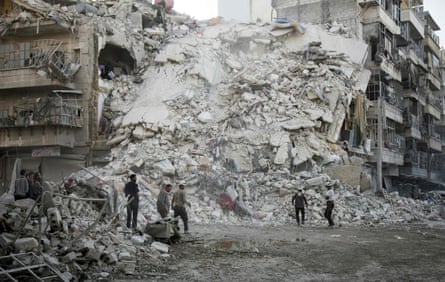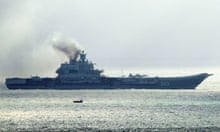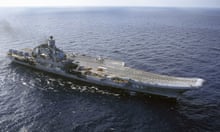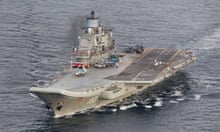Spain is facing criticism for reportedly preparing to allow the refuelling of Russian warships en route to bolstering the bombing campaign against the besieged Syrian city of Aleppo.
Warships led by the aircraft carrier Admiral Kuznetsov are expected to take on fuel and supplies at the Spanish port of Ceuta after passing through the Straits of Gibraltar on Wednesday morning.
Spanish media reported that two Spanish vessels, the frigate Almirante Juan de Borbón and logistical ship Cantabria, were shadowing the warships as they passed through international waters, and that the Admiral Kuznetsov, along with other Russian vessels and submarines, would dock at Ceuta to restock after 10 days at sea.
Late on Tuesday night, El País reported that the Spanish ministry of foreign affairs was reviewing the permit issued to the Russian flotilla to stop at Ceuta. The ABC newspaper quoted the ministry as saying: “The stops requested by Russia in Ceuta … are being reviewed right now based on the information we are receiving from our allies and the Russian authorities.”
At a meeting of defence ministers in Paris, Spain’s representative, Pedro Morenés, said the government would seek clarification from Russia about “the purpose and destination” of the ships, which he confirmed had “prior authorisation” to stop at Ceuta.
Last week British Royal Navy vessels monitored the Russian warships as they moved through the English Channel. The vessels were shadowed by the navy as they passed through the Dover Strait .
The enclave of Ceuta sits on the tip of Africa’s north coast, across the Straits of Gibraltar from mainland Spain, and bordering Morocco, which also lays claim to the territory. Although Ceuta is part of the EU, its Nato status is unclear, and since 2011 at least 60 Russian warships have docked there.
Nato secretary-general Jens Stoltenberg warned on Tuesday that Russian warships heading for Syria could be used to target civilians.
“We are concerned and have expressed very clearly by the potential use of that battle group to increase air strikes on civilians in Aleppo,” Stoltenberg said, adding that it was “up to each nation to decide whether these vessels may obtain supplies and refuel at different ports along the route to the eastern Mediterranean”.
Nato is monitoring the movement of the eight-strong carrier battle group from northern Russia en route to the eastern Mediterranean, where alliance officials fear it will launch fighter bombers to hit northwestern Syria early in November.
“The battle group may be used to increase Russia’s ability to take part in combat operations over Syria and to conduct even more air strikes against Aleppo,” Stoltenberg said.
Guy Verhofstadt, former prime minister of Belgium and now the EU’s representative on Brexit talks with the UK, called Spain’s decision to allow the refuelling “scandalous”.
Spain signed EU statement on Russian war crimes in #Aleppo last week; today helps refuel fleet on way to commit more atrocities. Seriously? pic.twitter.com/a0lYtMN3cV
— Guy Verhofstadt (@GuyVerhofstadt) October 25, 2016
The naval group is made up of Russia’s only aircraft carrier, Admiral Kuznetsov, as well as a nuclear-powered battle cruiser, two anti-submarine warships and four support vessels, likely escorted by submarines, Nato officials said.
The naval deployment, a rare sight since the end of the Soviet Union, is carrying dozens of fighter bombers and helicopters and is expected to join around 10 other Russian vessels already off the Syrian coast, diplomats said.
Washington’s envoy to Nato said Russia was within its right to move vessels through international waters. Military analysts say the deployment is a show of Russian force, as few countries have the ability to send an aircraft carrier group so far from home – although this would rely on refuelling in Spain.
“The problem would arise if this ship [Admiral Kuznetsov] contributes to the indiscriminate bombing of civilian targets in northwest Syria, particularly in and around Aleppo,” US ambassador Douglas Lute told reporters.

Sir Gerald Howarth, a former defence minister, told the Daily Telegraph it would be “wholly inappropriate” for a Nato member to refuel the vessels.
Former Royal Navy chief Lord West told the newspaper: “There are sanctions against Russia and it’s an extraordinary thing for a Nato ally to do.”
Spain’s foreign ministry told the Telegraph requests from the Russian navy were considered on a “case-by-case basis”.
A spokesman told the newspaper: “Russian navy vessels have been making calls in Spanish ports for years.”
A UK government spokesman said: “Access to Spanish ports is a matter for the Spanish authorities. HMG [Her Majesty’s government] has previously expressed concerns to the Spanish government about its hospitality to the Russian navy when we have concerns about Russia’s military activity.
“We are clear that the UK’s relationship with Russia should not be business as usual.”
Last week’s Russian passage through the English Channel came after British prime minister Theresa May condemned Vladimir Putin’s aggression in Syria, accusing Moscow of being behind “sickening atrocities” in support of Bashar al-Assad’s regime.
May’s deputy official spokesman rejected suggestions that it was a sign of weakness that Russia felt able to send its ships via the English Channel. A Downing Street spokesman said: “I would reject suggestions that the Russians feel we are too weak. Clearly, we are not weak at all.”
Nato said the prospect of Russia’s only aircraft carrier heading to the region does not “inspire confidence” that Moscow is seeking a political solution to the Syrian crisis.
Russian defence minister Sergei Shoigu said in September that the Admiral Kuznetsov-led Northern Fleet would be joining a taskforce in the Mediterranean.
According to the Russian news agency Tass, he told a defence board meeting that the plan was to bolster the Mediterranean fleet’s “combat capabilities”.
A statement from the fleet to the agency on 15 October said the group also consisted of the Pyotr Velikiy battlecruiser, the Severomorsk anti-submarine ship, the Vice-Admiral Kulakov destroyer and other support vessels.
Press Association and Reuters contributed to this report.






